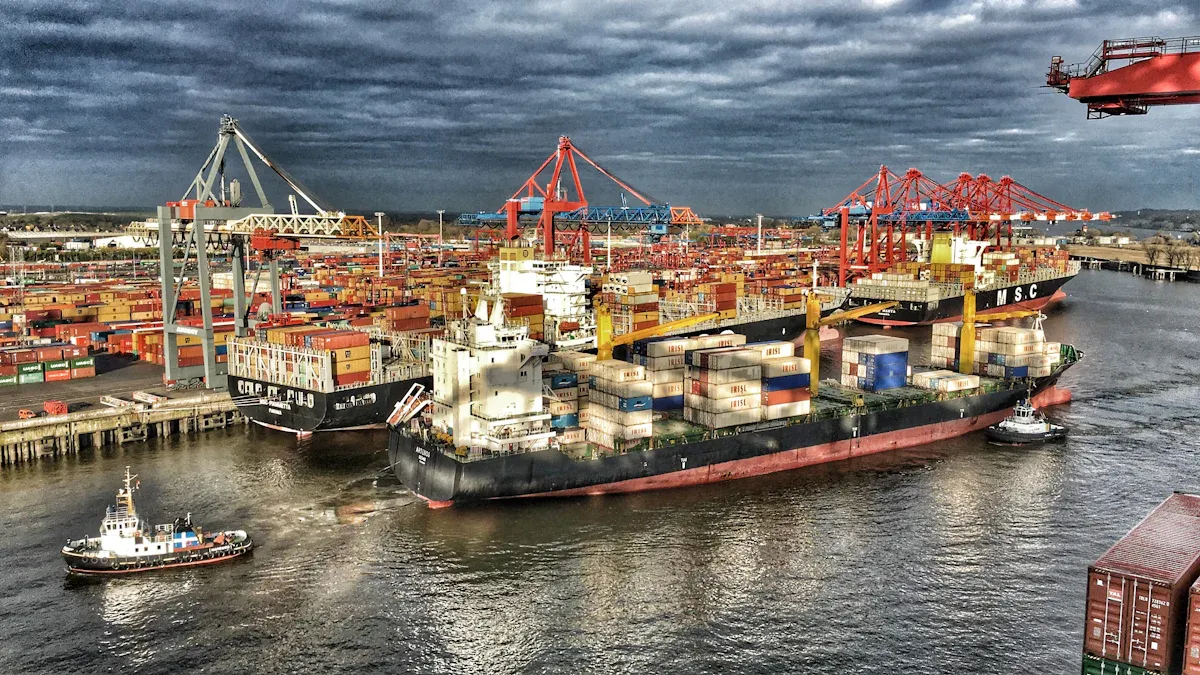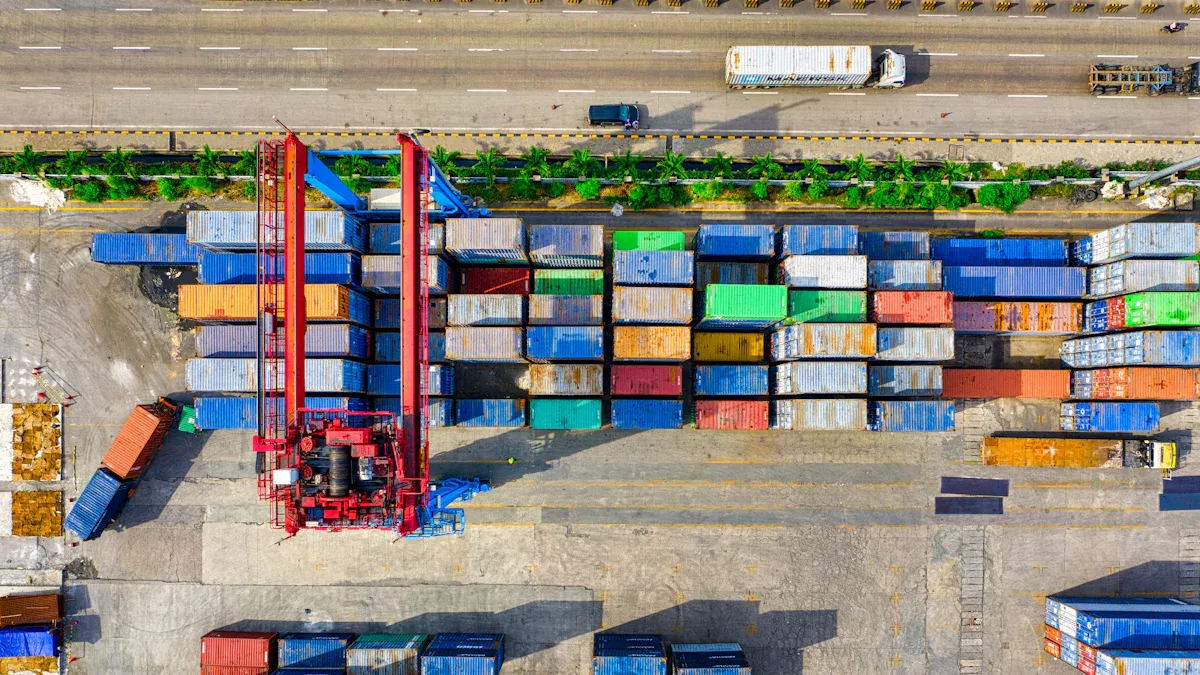Understanding Cross-Border Logistics in 2025

Cross-border logistics means moving goods, services, and data between countries. It is very important for world trade as globalization grows. By 2025, costs for moving goods across borders rose by 20%. This shows how it is getting harder to manage. Tools like JusTrade from JUSDA make customs checks easier, helping global trade run smoothly.
Key Takeaways
Moving goods between countries is key for global trade. It helps businesses find new buyers and markets around the world.
Tools like JusTrade make customs easier, cut waiting times, and follow updated trade rules.
Using smart technology and good teamwork improves shipping speed, saves money, and gets businesses ready for future problems.
What Is Cross-Border Logistics and Its Role in Global Trade
Defining Cross-Border Logistics
Cross-border logistics means moving goods, services, and data between countries. It includes tasks like shipping, storing, and handling customs rules. Each country has its own rules, taxes, and laws to follow. This helps goods move legally and without delays at borders.
Main parts of cross-border logistics are:
Moving goods safely across country borders.
Following customs rules to avoid fines or problems.
Giving correct paperwork to meet legal needs.
By managing these steps, cross-border logistics helps businesses grow and keep customers happy in different places.
The Role of Cross-Border Logistics in Facilitating Global Trade
Cross-border logistics is key to making global trade work. It helps goods move easily between countries, opening new markets for businesses. Recent data shows its importance:
These changes cut trade times by 21% and saved $108.7 million.
Good cross-border logistics matches rules and ensures businesses follow them. For example, online stores depend on logistics to ship products worldwide. Without it, delays and problems could hurt trade and business success.
Why Cross-Border Logistics Is Crucial in 2025
In 2025, cross-border logistics is more important than ever. Global trade is more complex, so businesses must adjust to new rules fast. Alejandro de Anda, a logistics expert, said flexible shippers do better during problems. This shows why planning and skilled partners matter.
Delays often happen because customs brokers check tariffs carefully. Strict inspections and paperwork make accuracy very important. By 2025, businesses using tools like JusTrade have an advantage. These tools speed up customs checks, cut delays, and follow changing trade rules.
Cross-border logistics also helps online shopping grow. Many online businesses face delivery problems. Better logistics systems are needed to fix these issues and meet customer needs.
As global trade grows, cross-border logistics is vital for success. It connects businesses to new markets, improves supply chains, and supports a connected world economy.
Key Parts of Cross-Border Logistics
Customs Compliance with JusTrade
Following customs rules is key in cross-border logistics. It ensures goods follow trade laws and pass customs quickly. You need to follow rules, give correct documents, and pay fees to avoid problems. JusTrade makes this easier with smart customs tools. Its online platform uses AI and big data to simplify customs steps, making them faster and more accurate.
For example, JusTrade's tool helps sort goods correctly. This reduces mistakes and speeds up customs checks. By using JusTrade, you can handle tricky customs rules easily. This keeps your shipments on time and running smoothly.
Supply Chain Management by JUSDA
Good supply chain management is very important for cross-border logistics. JUSDA uses advanced tools like AI and blockchain to improve efficiency. These tools share data instantly and automate tasks, changing how supply chains work.
EDI (Electronic Data Interchange) helps suppliers and businesses work better together.
Automated tasks lower mistakes, save time, and cut costs.
Real-time data helps you make quick and smart decisions.
JUSDA's system connects buying, shipping, and storing. This makes your supply chain stronger and saves money.
Warehousing and Inventory Management
Managing warehouses and inventory is crucial for cross-border logistics. Good warehouses reduce delays and make orders more accurate, keeping customers happy. Important measures show why good management matters:
Measure | What It Means |
|---|---|
Checks if stock records match actual items, helping manage stock better. | |
Order Accuracy | Tracks how many orders are correct, affecting customer happiness. |
Fill Rate | Measures how well a warehouse fills orders fast, cutting delays. |
Warehousing Costs | Shows the cost of running warehouses, showing how efficient they are. |
JUSDA's cloud tools track inventory in real time. This helps you manage stock better, save money, and work more efficiently.
Transportation and Freight Forwarding
Transport is a big cost in cross-border logistics. Getting good deals with carriers can lower these costs. Good freight forwarding ensures goods arrive on time, avoiding problems.
Factor | Cost Impact (%) | How to Handle It |
|---|---|---|
Transport Costs | Get good deals with carriers. | |
Customs Delays | 25% | Simplify customs and work with experts. |
Market Changes | 20% | Use different supply sources. |
JUSDA offers many transport options like air, sea, land, and rail. These choices let you pick the best and cheapest way to ship. With JUSDA's help, you can improve your transport plan and save money.
Risk Management in Cross-Border Logistics
Managing risks is important to avoid problems in cross-border logistics. Outside issues like rule changes or market shifts can cause trouble. Good plans help you deal with these challenges early.
Risk Type | How to Reduce It |
|---|---|
- Work with others to follow rules. | |
- Check product quality to avoid fines. | |
- Use automated tools for reports and sorting. | |
Inventory Risks | - Work closely with logistics partners. |
- Combine orders to save on sorting costs. | |
General Tips | - Use big logistics companies for better control. |
- Build trust with partners in the supply chain. |
JUSDA's risk tools focus on teamwork and technology. By automating tasks and building strong partnerships, you can avoid problems and stay ahead in cross-border logistics.
Benefits of Cross-Border Logistics
Opening Doors to New Markets
Cross-border logistics helps businesses reach new customers worldwide. It makes shipping and customs easier, opening markets that were hard to access before. International trade and online shopping are growing fast, boosting the need for better logistics. Regions like Asia-Pacific offer great chances for business growth. Investments in technology and infrastructure in places like Southeast Asia, Africa, and Latin America create new opportunities.
For example:
Online shopping growth needs faster and smarter delivery systems.
Better roads and trade routes make shipping quicker and safer.
New tools simplify logistics, letting businesses focus on expanding.
Using cross-border logistics lets businesses grow and reach more customers.
Saving Money with Smarter Logistics
Good logistics systems help businesses spend less money. By improving shipping, storage, and paperwork, companies can save a lot. Automation and smart tools have cut logistics costs by up to 20%. Here's how:
Key Area | How It Saves Money |
|---|---|
Transport and freight costs | Better deals and smarter tech lower expenses. |
Warehousing and inventory | Automation makes storage cheaper and faster. |
Administrative costs | Smart tools reduce mistakes and save time. |
Automation reduces errors, while lean methods cut waste. These steps make logistics cheaper and more efficient.
Strengthening Supply Chains to Handle Problems
Strong supply chains protect businesses from unexpected issues. Since 2020, global disruptions showed the risks of relying on few suppliers. Working with many suppliers and spreading production helps businesses stay flexible.
For example, moving supply chains to safer countries lowers risks. Governments like the U.S. support spreading supply chains to handle problems like Covid-19. This strategy helps businesses adapt to changes and keep growing.
Cross-border logistics connects businesses with suppliers and customers worldwide. It helps companies stay competitive and ready for future challenges.
Challenges in Cross-Border Logistics
Dealing with Complicated Customs Rules
Customs rules are different in every country. This makes cross-border logistics hard to manage. Each country has its own taxes, rules, and paperwork. If goods are labeled wrong or rules are broken, fines and delays happen. For example, wrong tariffs or product categories raise costs and slow supply chains. Trade agreements like USMCA often change, so staying updated is important. Accurate paperwork helps avoid problems.
To handle these challenges, you can:
Learn about new customs rules and work with experts.
Use tools like JusTrade to label goods correctly and avoid mistakes.
Send shipment alerts early to speed up customs checks.
These steps help make logistics smoother and reduce risks.
Solving Language and Culture Problems
Language and culture differences can cause problems in global logistics. Misunderstandings happen when working with people from different cultures. Some countries care more about social or environmental issues, which can cause confusion. Teams speaking different languages need clear communication that respects cultural differences.
To fix these problems, you should:
Learn about local customs to talk better with suppliers.
Study cultural differences to match your business with local values.
Work with local partners who understand the culture and can help.
By respecting cultures, you can build better partnerships and improve logistics.
Fixing Infrastructure and Technology Issues
Bad roads and old technology make cross-border logistics harder. In places like Mexico, poor transport systems slow down shipments. Cargo theft and outdated tools add to the problem. Experts like Dr. Gaston Cedillo say better roads and digital tools are needed. Using AI and IoT can track shipments in real time and give you an advantage.
To solve these issues, you should use advanced tools like AI for customs and paperwork. JusTrade can make processes easier and faster. Investing in better roads and digital systems helps reduce risks and improve logistics.
Preparing for the Future of Cross-Border Logistics in 2025

Working Together with JUSDA for Better Logistics
Strong teamwork is key to improving global shipping. Partnering with experts like JUSDA makes shipping easier and faster. JUSDA helps solve problems like customs delays and limited space. Sharing live data helps avoid issues and fix problems quickly.
For example:
Shared routes cut extra travel, saving time and money.
Local experts help follow rules, lowering risks.
Long-term teamwork also helps businesses grow. JUSDA works with factories to show how good communication improves shipping.
Using Technology to Make Shipping Easier
Technology is changing how goods are shipped worldwide. Automation and smart tools make work faster and reduce mistakes. JUSDA uses advanced tech like AI and IoT to improve shipping.
Some key tools include:
Robots in warehouses pack items faster and better.
Smart systems plan the best way to ship goods.
These tools save time and money. For example, automation stops mistakes in data entry. Using these tools helps businesses stay ahead in global trade.
Adjusting to New Trade Rules
Following trade rules is very important for global shipping. Changing rules can slow down goods, so staying updated is a must. Checking rules often helps you prepare and adjust plans.
Steps to stay ready include:
Match your company rules with trade laws.
Use many suppliers to avoid relying on one place.
Try tech tools to track rule changes live.
JUSDA focuses on being flexible and ready for changes. By following trade rules, you can handle tariffs and keep shipping smooth. This keeps your business strong even when rules change.

JUSDA Solutions
To provide you with professional solutions and quotations.
Cross-border logistics helps global trade grow by linking businesses to markets worldwide. Tools like JUSDA and JusTrade make tough steps easier with smart technology. Using better tools, strong partnerships, and good planning is key to doing well. For instance, BNP Paribas uses tech to improve work and go green, reaching big goals like 850MW of working power.

By using new ideas, you can succeed in the changing world of 2025.
See Also
Embracing Digital Solutions for Future Logistics Innovations
Transforming Logistics Through AI-Driven Supply Chain Solutions
Exploring Innovations in Sea Freight Logistics for 2024
The Transformative Role of Innovation in Logistics Today
Addressing Global Supply Chain Growth Challenges Effectively
